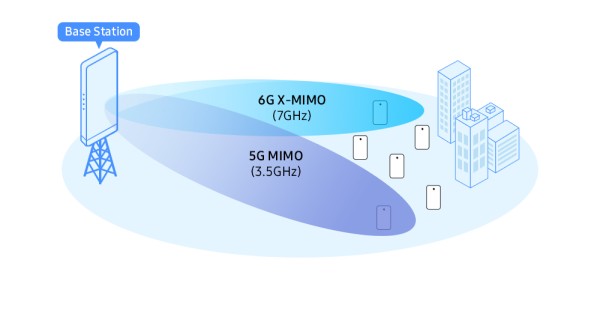Samsung Electronics and KT Corporation, two giants in the telecommunications industry, have recently joined forces to pioneer research on 6G technologies, aiming to significantly enhance signal quality and overall network performance. This collaboration was formalized through a memorandum of understanding (MOU) and marks a significant step towards the future of telecommunications.
X-MIMO and AI: Driving Next-Gen 6G Wireless Innovation
At the core of their joint research initiative, Samsung and KT are set to delve into multi-antenna technologies that promise to extend coverage over the prospective 6G frequency bands. A particular focus will be on integrating Artificial Intelligence (AI) within wireless communication frameworks to bolster network stability and efficiency.
The partnership has already kickstarted research into eXtreme multiple-input multiple-output (X-MIMO), a sophisticated ultra-high-density antenna technology. X-MIMO is designed not only to expand 6G coverage but also to accelerate data transmission speeds, which are crucial for supporting the burgeoning data needs of modern technologies and applications.
Overcoming 6G Signal Loss in High-Frequency Bands
The recent World Radiocommunication Conference 2023 (WRC-23), hosted by the International Telecommunication Union (ITU), spotlighted the 7 GHz band (7.1258.4 GHz) as a prime candidate for 6G deployment. This band is preferred for its favorable frequency characteristics and spectrum availability. However, it also poses significant challenges, primarily due to greater signal path loss at higher frequencies compared to the 3.5 GHz C-band utilized in 5G networks.
To combat this, Samsung and KT’s research will focus on beamforming technology, which enables the transmission of focused signals in specific directions, and multi-spatial transmission technology, which allows multiple beams to send data to several users at once. These technologies are essential for enhancing the performance of X-MIMO systems in the 7 GHz band, where a greater number of antennas are required compared to 5G systems.
Leveraging AI for Enhanced Network Reliability
Another promising area of this partnership is the exploration of AI’s potential to transform telecommunications. AI technologies can predict and proactively manage communication disruptions, such as those that might occur during video streaming. This proactive approach to network management could significantly enhance the user experience, especially in edge coverage areas where connectivity is typically less robust.
Angelo Jeongho Park, Executive Vice President and Head of Advanced Communications Research Center (ACRC) at Samsung Research, emphasized the commitment to developing innovative 6G technologies. “Our collaboration with KT will serve as a key foundation for advancing next-generation communications through reasonable, cost-effective investments,” he stated.
Jong-Sik Lee, Executive Vice President and Head of Future Network Laboratory at KT, also expressed optimism about the joint research’s potential. “Through this partnership with Samsung Electronics, we expect to secure advanced network technologies that distinctly improve the quality of the user experience,” he remarked. The initiative is set to propel KT’s efforts in leading future mobile communication innovations.
Samsung and KT’s Roadmap for 6G Communication Standards
This partnership between Samsung Electronics and KT Corporation represents a forward-thinking approach to meeting the future demands of global telecommunications. By addressing the technical challenges and exploring new possibilities such as AI integration, the two companies are paving the way for more reliable, faster, and more efficient communication networks. As 6G technology continues to develop, such collaborative efforts will be crucial for setting global standards and delivering the advanced connectivity that future digital landscapes will require.
With the telecommunications landscape rapidly evolving, the research and advancements from this collaboration could soon define the next generation of mobile communications, ushering in an era of enhanced connectivity that could transform how we interact with technology daily.
























